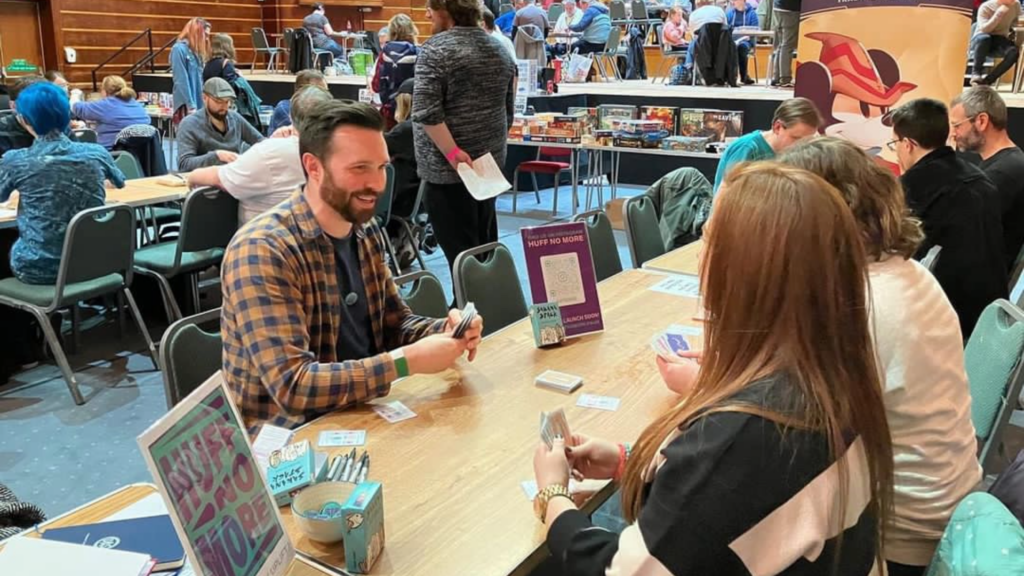This is the second part of the conversation. You can catch up with the first post here. In this post we’ll find out what Mikey has learned from the Kickstarter campaign. You can find out more about the game here, back it on kickstarter and find Mikey on Instagram.
Joe: Let’s talk about the Kickstarter campaign. Are you sleeping well? Are you eating well? Or have you not slept or eaten for weeks?
Mikey: Without having any notion of what it was going to be like, I think the anticipation adds a level of nerves and a level of stress to the campaign. There were lots of nerves two or three days before. I thought I’d be so much cooler, by the way. I thought, ‘yeah, it’ll be fine’. And then two days before I was like, ‘ahhhhh’.
We knew we’re going to make mistakes, but there were many things that I just didn’t realise, that I should have probably read about and prepared. Then there were some things no preparation could account for. The first couple of days are really busy. Lots of people asking you questions and you’re frantically not wanting to keep anyone hanging. The first two days are quite stressful. But after that, it calmed down.
Joe: You mentioned the questions, what sort of comments did you get?
Mikey: Some really valid questions. For example, we have a deluxe pack which has an extra six pucks. There are silicon rings that go around the pucks. Someone asked the question, ‘do we get silicon rings for the extra pucks?’. I hadn’t even thought about the fact that if we’re giving extra packs, why not give them rings to go with those as well. So everyone who’s bought that will now get 12 rings instead of six. It was just one of those things you just don’t realise until someone asks the question and then you kick yourself because it was so obvious.
We also had one person who was initially quite aggressive. They misunderstood who we were and thought we were a big company trying to sell games through kickstarter. I wrote back and explained that we were just a small family startup and this is our first Kickstarter. They responded and apologised, then gave loads of help, tips and support. But it was quite aggressive at first, which I was taken aback by. When you read a message like that you have to think about how you answer it because the answer and the question are public. You have to be thoughtful; so every answer takes longer to write.
Joe: So after you launched, what mistakes did you realise you’d made?
Mikey: There were little mistakes. People were asking questions like the one about the pucks, and I thought ‘why didn’t I not just make sure that that was clearer?’.
The big mistake was shipping. I put shipping into the Backerkit pledge manager. When I was creating the campaign, Kickstarter asked you to put shipping down. I put the shipping numbers in that would be used in Backerkit, so that it all matched up. But this meant that on launch, everyone was asked to pay for shipping. I didn’t realise that the shipping fee wouldn’t be transferred across so every backer would be charged twice: once at the beginning of the campaign, then again at the fulfilment stage. What you need to do is put £0 in for shipping in Kickstarter, and leave the shipping to the pledge manager. But of course, when you go live, you can’t edit any pledges. As soon as someone backs one pledge it’s locked in.
Joe: That’s interesting, isn’t it? And it makes sense.
Mikey: Yeah, it makes sense, but it totally screwed us. I had to duplicate all the pledges with a new £0 shipping and end the old pledges. Next I had to message everybody who paid for shipping and explain, ‘I’ll either refund you the money and you can pay later after the campaign or cancel your pledge and rebuy this one’.
Joe: So how many people did this affect?
Mikey: I think the first 50 or 60 people; the fix is a little bit of admin on my side. But it just felt like a stupid mistake. I wish I’d known about it beforehand. It makes you just look a bit crappy on the first day ’cause you’re sending out “sorry, I f**ked up” emails so early on.
Joe: There’s something to be said for your honesty in solving it. I think the this has happened, we’re sorry and here’s how we’re fixing it approach is good. There should be more of that in the world, to be honest.
Mikey: Yeah, we got no negativity from it at all. Not one person was grumpy. No one cancelled their pledges.
Another challenge were some strong comments about pricing tiers and why we were comparing Kickstarter price to RRP. My pricing structure was “this will be £55 RRP, but you can have £49”. We found that this was more of a detriment, and we should have just said how much it would cost, without that comparison.
Joe: From my own personal experience of backing (too many) Kickstarters, I’m never thinking about the fact it’s going to become a thing I can buy in the shops as well. I’m just thinking about the game that I can get now. I’m not worried about what you charge someone else later and how my price compares to that person’s price.
Did you notice that your backers are skewed to UK and European markets?
Mikey: Yeah, mostly EU-UK, a few in Australia ,some in America and Canada. Most of my advertising was skewed that way. We did a little bit to the US because it’s a big market. For the size of our company and what we’re aiming to produce, trying to get it into the UK and the EU comes first. We’ll look into other markets later. Shipping internationally is also expensive. We’re using GamesQuest, a fulfilment company and they’ve been really good helping us to make decisions about shipping and costs.
Joe: Thinking about Kickstarter, you could have used Backerkit, GameFound, Indiegogo. Why choose Kickstarter?
Mikey: Kickstarter was familiar to me, I didn’t really know much about the others. Kickstarter’s probably a slightly more well-known brand than the others in the family markets which Kugo fits neatly into, so that was a factor in the decision too.
Joe: Thanks for the details and the insight. It’s clear that you’ve learned so much throughout the campaign so far. You come across as somebody who enjoys the experience of learning something new.
Mikey: Yeah, I’m a serial learner. I’ll do that until I die. There’s plenty of things I’m not very good at, but I’d like to have a basic understanding of everything and then go, “That’s not for me, that’s for somebody else.” Marketing is something I’m notoriously bad at. It’s not something I’ve really enjoyed. But it’s nice to get an understanding of how it works.
Joe: It’s hard. You’re trying to convince someone that you’re really good at something. And I think for a lot of us we don’t want to say that out loud. We just want you to look at the picture and you to like it without me having to convince you.
Mikey: I think as a nation, we’re not very good at that either. I think the Americans are very good at presenting themselves and saying how good they are. Have you ever been in a meeting and seen the American and European divide? The Americans would be like, “Hi, I’m John. I’ve done this, I’ve done that, I’ve done that.” It’s almost like part of their resume as they introduce themselves. You never get that in English meetings. We barely give our titles out loud. It’s like, “Hi, I’m John.”
Joe: I’m just thinking about that and what I’m doing at the moment. The idea of ‘does it work when I’m not in the room’? I don’t know. I don’t think I’m at that belief stage at the moment. Let’s round this up, is there a key piece of advice you’d give to anyone about to go through this process?
Mikey: If I was to do this again, I would build up the numbers – that’s the biggest one. If you have enough numbers behind you, your stress levels are much lower. Either pay for them or do it organically. But having those up, I think is my number one piece of advice.
numbers and don’t stop
Mikey
Then just not ever stopping. I think there’s so many times where you get properly kicked for whatever reason, whether emotionally, where you are in your life, where the Instagram algorithm kills your growth. There are moments of lows where you’re like, ‘why am I doing this?’ And you might want to quit. But, If you wanna get this game out into the world, you’ll get it out. I believe that. I think that if you believe that you’re going to do something, it will happen. It might be different from your vision, but I think it will happen.
Numbers and don’t stop.
Joe: Numbers and don’t stop. All right, I can aim for those. Aim for the numbers and never stop. Thank you so much for your time, it’s been a fascinating and insightful converasation!
Thanks to Mikey for his time, especially when he was running an active Kickstarter! If Kugo has taken your fancy, please take a look at the kickstarter page (the campaign ends Thursday, June 20 2024 8:00 AM BST). You can also find part 1 of this post here.
And, if you’ve enjoyed the post, drop your email in the box below and you’ll get notified of all future posts straight to you inbox!


